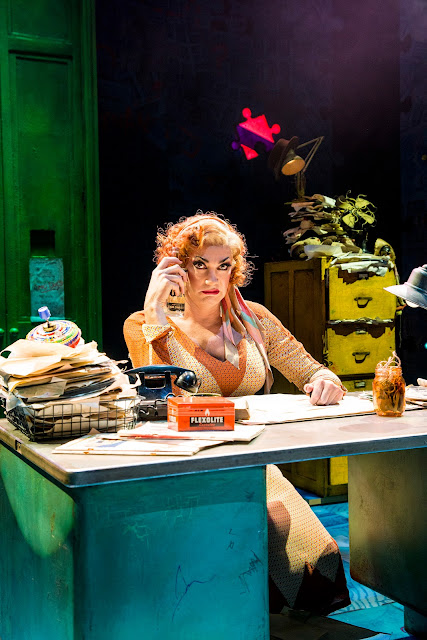Curve, Leicester
Wednesday 29th March, 2023
‘With new life there’s new hope,
right?’
Malorie Blackman was a seminal figure in my adolescence and a
huge influence on my love of literature. I first read her Noughts and
Crosses series aged 13. To my maturing mind the books were revelatory; they
dealt with adult themes such as race, politics, sex and class, with striking confidence,
a gripping plot and without ever talking down to the reader. These were
grown-up novels and I ate them up with relish. In the 20 years since publication
Blackman’s story has gone from strength to strength, becoming a set text for
schools, spawning a hit BBC tv series, and now inspiring it’s second stage adaptation.
Sabrina Mahfouz’s version highlights the prescience and urgency of Blackman’s story,
conveying both the universality of the themes while emphasising their pertinence
in contemporary society.
Sephy and Callum have known each other all their lives, their
bond is seemingly unshakeable, yet the society they live in places them worlds
apart in terms of wealth, liberty, education and class. Sephy Hadley is a
Cross, the daughter of a top politician, living in an expensive house with its
own private beach, and all the material riches she could ever want. Callum McGregor
is a Nought, the son of the Hadleys’ maid, a lower-class citizen within a racially
segregated state built on oppression and capital punishment. A new government
policy permitting the integration of Noughts into Cross schools, along with the
increasing violence and unrest brought about by the extremist paramilitary group,
the Liberation Militia, forces Sephy and Callum to confront their differences
and question their place in social history. Political and personal clashes
ultimately end in tragedy in Blackman’s modern parable, which still holds the
power to shock.
Mahfouz stays true to the source material in her adaptation,
while adding her own linguistic flourishes that lift the piece into the realm
of drama. I particularly enjoyed Mahfouz’s sections of verse which portray the
inner thoughts of our protagonists. Internal rhymes and a striking use of
mirroring/repetition are earthily poetic while demonstrating both the confluence
of the characters and the incongruous, duplicitous systems which dictate their
lives.
Simon Kenny’s deceptively simple design makes great use of
blocky, urban set pieces which occasionally melt into gauzy windows or burst
into pops of violence – whether rhetorical or physical – via Ian William
Galloway’s vast video projections that flood the stage. We are in a familiar
world of rolling news channels, shopping malls and mobile phones (although only
Crosses are permitted to own them), which hammers home the similarities with
the increased racial tensions in our own society over recent years.
If Esther Richardson’s production is a little rough around
the edges at times this does not detract from the narrative punch. In fact, the
lack of gloss and intimacy of the piece draws the audience into this world,
relying not on high tech theatrical wizardry, but old-fashioned story-telling
charm. Yes, Blackman and Mahfouz’s social commentary is painted in broad
strokes, but this plays well with the mainly teenaged audience, who were rapt and
enthusiastic throughout. Long may Noughts and Crosses inspire and fire
up generations to come.
 |
| The cast of Noughts and Crosses Credit: Robert Day |





